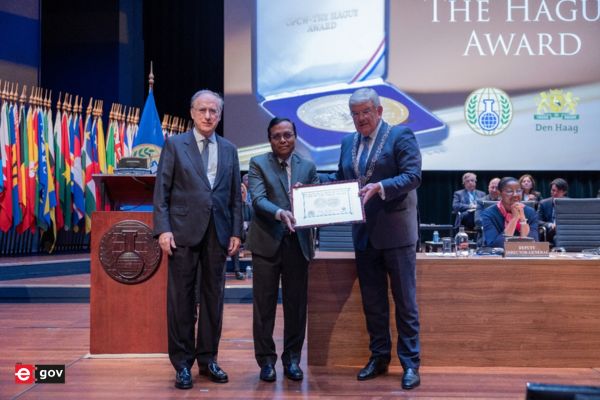Context:
Recently, the OPCW-The Hague Award for 2024 was conferred upon the Indian Chemical Council (ICC).
More on the News

- The award was given during the 29th Session of the Conference of the States Parties (CSP) of the Organisation for the Prohibition of Chemical Weapons (OPCW) in the Hague.
- This is the first time the award has been given to a chemical industry body.
- This award recognizes ICC’s efforts in promoting chemical safety, Chemical Weapons Convention compliance, and enhancing security within India’s chemical industry.
About CWC and OPCW
The “Convention on the Prohibition of the Development, Production, Stockpiling, and Use of Chemical Weapons and on their Destruction” also known as the Chemical Weapons Convention (CWC) came into force in 1997.
The Convention aims to eliminate an entire category of weapons of mass destruction by prohibiting the development, production, acquisition, stockpiling, retention, transfer or use of chemical weapons by States Parties.
A unique feature of the Convention is its incorporation of the ‘challenge inspection’, whereby any State Party in doubt about another State Party’s compliance can request a surprise inspection.
OPCW is responsible for implementing the CWC and works with 193 States Parties to achieve the objectives of a chemical weapons-free world.
- Headquarters – The Hague, Netherlands.
OPCW won the Nobel Peace Prize in 2013 for its extensive efforts in eliminating chemical weapons.
India is an original signatory of the CWC, and the National Authority Chemical Weapons Convention (NACWC) is responsible for its implementation in India.
About Indian Chemical Council (ICC)
- The ICC, established in 1938, is dedicated to the development and promotion of the chemical industry in India.
- ICC is India’s premier body representing the chemical industry, which accounts for over 80% of the country’s chemical industry which is valued at $220 billion.
ICC Initiatives:
- Chemical Weapons Convention Helpdesks: These initiatives helped increase industry compliance with the CWC and facilitated e-filing for chemical declarations.
- Nicer Globe Initiative: Focuses on improving chemical transportation safety in India through real-time monitoring and emergency response capabilities.
- Responsible Care (RC) Program: Encourages companies to uphold safety and security standards in the industry.
- Security Code of RC: Introduced to enhance security within the chemical sector.
- ICC’s commitment to responsible industrial practices and its efforts to align with the objectives of the CWC highlight India’s proactive role in the global fight against chemical weapons.

